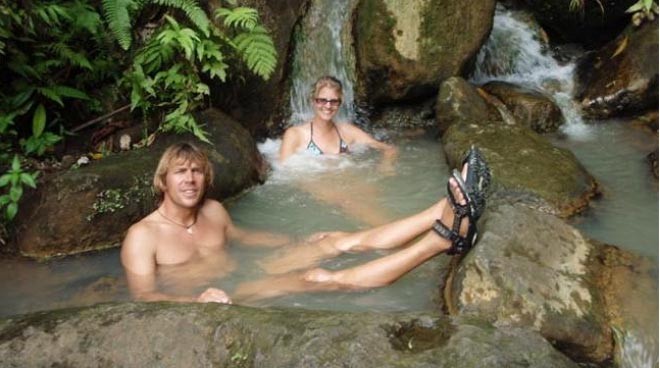Horror in Paradise - suspected murder of cruising sailor
by Nancy Knudsen, BW Media on 19 Oct 2011

Stefan and Heike SW
When German cruising sailor 40-year-old Stefan Ramin disappeared in suspicious circumstances in the beautiful island of Nuku Hiva in the Marquesas and some remains thought to be his were found in a camp fire, it was an easy leap for the international press to cry 'Cannibal'**! After all, history tells us that the ancestors of today's easy going and peaceful Polynesians in the islands of the Marquesas were once cannibals.
Stefan and his girlfriend Heike Dorsch, 37, who have been on a sailing expedition since 2008 in their 46ft catamaran Baju, stopped off at the island, which is around 900 mile north east of Tahiti, on September 16. They had planned to spend several months cruising French Polynesia.
He is believed to have gone off with a local guide called Henri Haiti, on a goat hunt, a tradition on the island.
However, according to Heike, Haiti returned alone, saying, 'There has been an accident. He needs help.'
She told investigators that Haiti was trying to lure her into a trap, that it was 'absolutely necessary' she follow him into the forest to help her companion, wounded a few kilometres away. But he is then alleged to have sexually assauted her and chained her to a tree.
Hours later Heike managed to free herself and raise the alarm. A team of 22 police officers launched a search of the island, which has a population of just 2,789.
They uncovered what are believed to be the German's remains. DNA tests will be carried out on bones, a jaw, teeth and some melted metal — believed to be fillings. French chief investigator José Thorel, based on Tahiti, said that the DNA tests would take weeks to confirm if the remains belonged to missing Stefan. They have been sent to Paris to be submitted to the expert services of the Institute of Criminal Research of the National Gendarmerie (IRCGN).
Whether to wait for the results of this analysis to determine with certainty who owned the human remains, the prosecutor told the press that he remained in little doubt about their origin. He added that there was a similarity found between the denture found in the fire and the information contained in medical records.
Henri Haiti is still missing and the army have been drafted in to help track him down. Given the facts of the case, the prosecutor in Papeete has decided to open a spot investigation on counts of sexual assault, false imprisonment and murder. The police are currently also calling for witnesses.
**There has been no known instances of cannibalism in the Marquesas in recent times. It is still debated why many Polynesian tribes or nations practiced cannibalism.
Indeed a large number of Pacific Islands residents did so in pre-historic times. One theory is that cannibalism was more for food than ritual, although ritual played a big part. An offering to the gods was called Ika, which means fish, and a sacrifice was caught and, just like a fish, was hung by a fishhook in the sacred place.
Those to be eaten were tied and hung up in trees until needed or kept in pits below the banyan trees, then had their brains bashed out on execution blocks with a club.
Women and children seem to have been cannibalized just for food, whereas warriors killed in battle were offerings to the gods and were eaten by their conquerors to absorb their power; their skulls were kept by their slayers for the same reason.
Today, the population of Nuku Hiva is much reduced from the numbers in ancient times, owing largely to diseases brought by Europeans to the islands.
With less than 3,000 people on the island, their old fruit trees and large wild vegetable gardens, planted to feed a much larger population, are rich with plentiful produce.
No-one goes hungry on Nuku Hiva.
If you want to link to this article then please use this URL: www.sail-world.com/89753